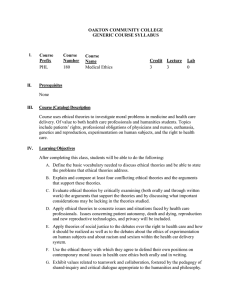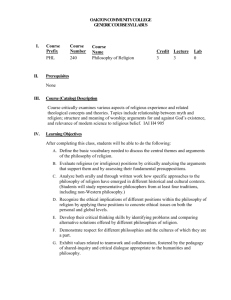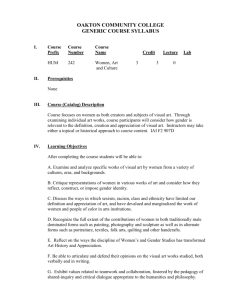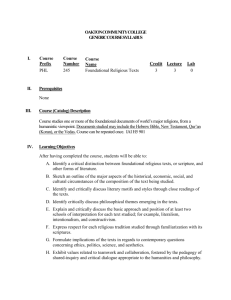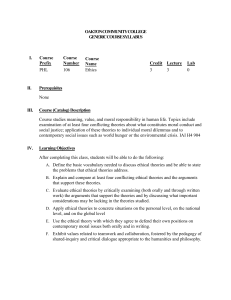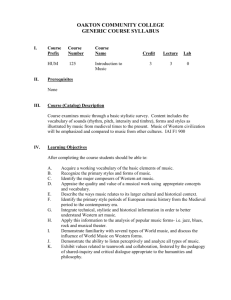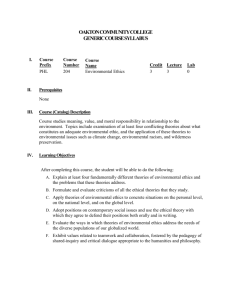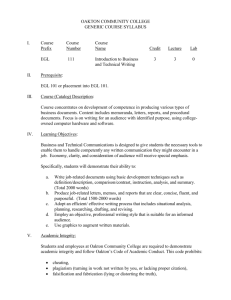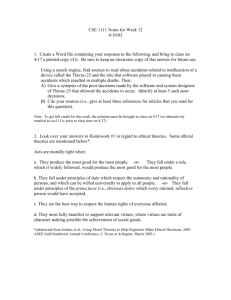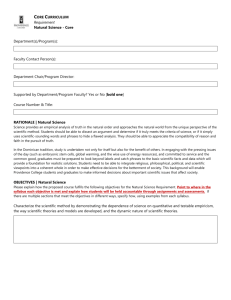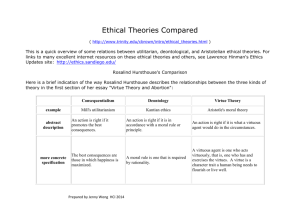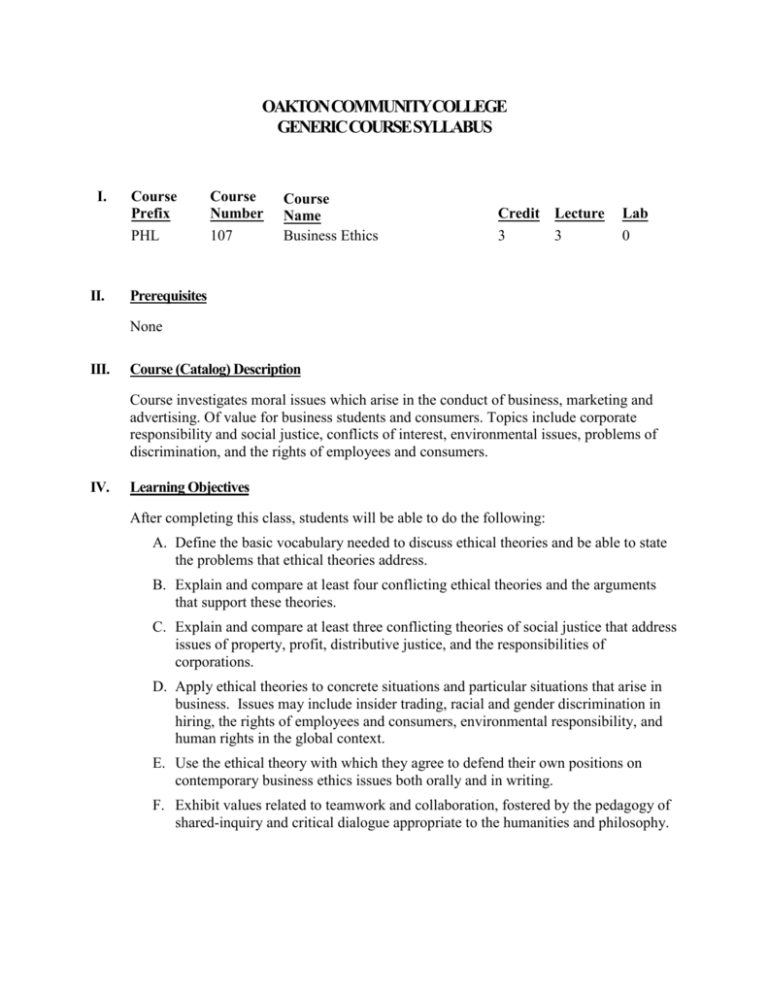
OAKTON COMMUNITYCOLLEGE
GENERIC COURSE SYLLABUS
I.
II.
Course
Prefix
PHL
Course
Number
107
Course
Name
Business Ethics
Credit Lecture
3
3
Lab
0
Prerequisites
None
III.
Course (Catalog) Description
Course investigates moral issues which arise in the conduct of business, marketing and
advertising. Of value for business students and consumers. Topics include corporate
responsibility and social justice, conflicts of interest, environmental issues, problems of
discrimination, and the rights of employees and consumers.
IV.
Learning Objectives
After completing this class, students will be able to do the following:
A. Define the basic vocabulary needed to discuss ethical theories and be able to state
the problems that ethical theories address.
B. Explain and compare at least four conflicting ethical theories and the arguments
that support these theories.
C. Explain and compare at least three conflicting theories of social justice that address
issues of property, profit, distributive justice, and the responsibilities of
corporations.
D. Apply ethical theories to concrete situations and particular situations that arise in
business. Issues may include insider trading, racial and gender discrimination in
hiring, the rights of employees and consumers, environmental responsibility, and
human rights in the global context.
E. Use the ethical theory with which they agree to defend their own positions on
contemporary business ethics issues both orally and in writing.
F. Exhibit values related to teamwork and collaboration, fostered by the pedagogy of
shared-inquiry and critical dialogue appropriate to the humanities and philosophy.
COURSE SYLLABUS (GENERIC)
Page 2
PHL 107
V.
Academic Integrity
Students and employees at Oakton Community College are required to demonstrate
academic integrity and follow Oakton’s Code of Academic Conduct. This code prohibits:
cheating,
plagiarism (turning in work not written by you, or lacking proper citation),
falsification and fabrication (lying or distorting the truth),
helping others to cheat,
unauthorized changes on official documents,
pretending to be someone else or having someone else pretend to be you,
making or accepting bribes, special favors, or threats, and
any other behavior that violates academic integrity.
There are serious consequences to violations of the academic integrity policy. Oakton’s
policies and procedures provide students a fair hearing if a complaint is made against
you. If you are found to have violated the policy, the minimum penalty is failure on the
assignment and, a disciplinary record will be established and kept on file in the office of
the Vice President for Student Affairs for a period of 3 years.
Details of the Code of Academic Conduct can be found in the Student Handbook.
VI.
Outline of Topics
(This is a sample outline of topics. In your outline of topics, please specify the dates when
you will cover specific topics and other important dates such as exams and paper
deadlines.)
I.
Introduction to ethical theories
A. Kantianism
B.
Utilitarianism
C.
Moral relativism
D. The ethic of care
E.
II.
Morality and religion
Social justice and capitalism
A. Traditional theories of property and profit including Smith
B.
The Marxist challenge to traditional theories
C.
Modern theories of property and profit
1. Nozick’s libertarianism and Friedman
COURSE SYLLABUS (GENERIC)
PHL 107
2. Rawlsian liberalism, Stiglitz and Krugman
D. New issues in property: intellectual property
III.
Moral responsibility and corporations
A. Stockholders versus stakeholders
B.
Moral responsibilities of employees
C.
Insider trading
IV.
Discrimination in hiring
A. Diversity and affirmative action
B.
V.
Sexual harassment
The rights of employees
A. Privacy
B.
Health and safety
C.
Unionization
D. Whistleblowing
VI.
The rights of consumers
A. Marketing
B.
VII.
Safety
Environmental issues
A. Government regulation
B.
The debate over growth
VIII.
Cultural differences and international business
IX.
Social justice and globalization
A. Legacies of colonialism
B.
Human rights today
C.
Multinational corporations
D. The role of global agencies such as the IMF and the World Bank
Page 3
COURSE SYLLABUS (GENERIC)
Page 4
PHL 107
X.
The current economic crisis and the new issues that it reveals
VII. Methods of Instruction
Course may be taught as a face-to-face, media-based, hybrid, or online course.
VIII.
Lectures and discussion
Small group work
Films
Student presentations and debates
Guest speakers
Field trips may be required
Course Practices Required
(Please include information here about all expectations you have for your students
regarding behavior, work, etc. The following are sample topics you may wish to cover.
Please be aware that you must require students in this course to produce at least 15 pages
of critical written assignments over the course of the semester. These may be assigned in
a variety of ways including journals, response papers, field trip projects, etc.)
IX.
Attendance
Standards for written work
Quizzes/Exams
Participation
Essays
Final Project
Special policies about make-up exams, late papers, or other matters of concern
Instructional Materials
Note: Current textbook information for each course and section is available on Oakton’s
Schedule of Classes.
A text such as Ethical Issues in Business edited by Donaldson, Werhane, and Cording or
Ethical Challenges to Business-As-Usual edited by Collins-Chobanian should be chosen.
COURSE SYLLABUS (GENERIC)
Page 5
PHL 107
Appropriate texts will contain case studies as well as traditional philosophical selections.
X.
Methods of Evaluating Student Progress
(In this section, please present the percentages or point breakdown of their final grade.
The writing assignments should count for at least 40% of the final grade. An example
follows.)
A. Quizzes/Exams……40 points
B. Essays……40 points
C. Final project with oral presentation……10 points
D. Attendance and participation………10 points
E. Grading scale: 90-100, A…….80-89, B………70-79, C……….60-69……..D
XI.
Other Course Information
A. Disabilities
If you have a documented learning, psychological, or physical disability you may be
entitled to reasonable academic accommodations or services. To request accommodations
or services, contact the Access and Disability Resource Center at the Des Plaines or Skokie
campus. All students are expected to fulfill essential course requirements. The College
will not waive any essential skill or requirement of a course or degree program.
B. Discrimination
The Oakton Community College Catalog states:
Oakton Community College does not discriminate on the basis of race, color, creed,
religion, national origin, disability, age, sex, sexual orientation, or marital status in
admission to and participation in its educational programs, activities and services, or
employment practices. The College does not tolerate sexual harassment or sexual assault
by or of its students or employees.
In keeping with this policy of tolerance and non-discrimination, in this class all of us
(myself included) should strive to listen and give careful consideration to all ideas
expressed in class, especially those that are different from our own, without attacking or
demeaning the people who have those views. We should also strive to avoid using
insulting terms or telling offensive jokes when talking to or about individuals or groups.
COURSE SYLLABUS (GENERIC)
Page 6
PHL 107
C. Instructor information
Office and office hours:
Phone:
Email and website:
Approval Dates:
(Faculty: Do not include the following information on your individual syllabi created for class
distribution.)
Effective beginning term:
Fall 2013
Ending term:
Syllabus prepared by: Hollace Graff
Date: March 2006
Revised by:
Date: June 2010
Hollace Graff
Reviewed by Chair:
Hollace Graff
Date: July 2010
Approval by Dean:
Linda Korbel
Date
June 2013

